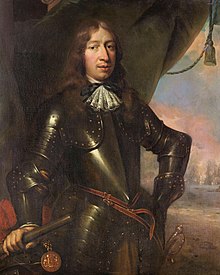Willem Joseph van Ghent

Willem Joseph van Ghent , Baron van Ghendt, (baptized May 14, 1626 in Winssen , Beuningen , Gelderland ; † June 7, 1672 in the sea battle in Solebay ) was a Dutch admiral. He is considered to be the founder of the Dutch Marine Corps .
Live and act
Willem Joseph van Ghent was from the nobility and embarked on a military career. From 1645 he first served in the regiment of Count von Horn and in 1648 became a captain. As part of the Second Northern War , he commanded a regiment of Walloons landing on Fyn under Michiel de Ruyter . In 1663 he became major and in 1664 lieutenant colonel and commander of the garrison of the port city of Hellevoetsluis . In the Second Anglo-Dutch War , his connection with the Navy deepened. He was involved in the battle of the Dutch merchant fleet against the English in the Bay of Bergen and was brought in by Johan de Witt as an advisor when it came to setting up a regiment of marines for landing operations (1665), which he commanded as a colonel. During the secret preparations for landing operations against England, he was appointed sea captain on the Gelderland , a ship with 66 cannons of the Admiralty of Rotterdam , for reasons of secrecy . He participated in the four-day battle in part (where his ship suffered on the first day because of the swell broken mast and he continued the battle on another ship) and at St. James's Day Battle , where he intended to cover De Ruyter's flagship Seven Provinces was used (and narrowly escaped an English fire), but there was no opportunity for landing operations. But it was the first use of his marines (Mariniers). When Cornelis Tromp was deposed after the battle because of his arbitrariness, Johan de Witt appointed him his successor as Admiral Lieutenant of Holland and West Friesland. He hesitated at first so as not to be drawn into the dispute between Republicans and Orangists (including Tromp), but then accepted at De Ruyter's persuasion. In 1667 he commanded a flotilla in the North Sea with which he threatened Scotland. In May the planned combined land and sea operation finally took place during the raid on the Medway , in which he and his marines played an essential role in the success. With on its flagship Agatha was Cornelis de Witt . The destination was the repair docks off Chatham on the Thames, where the English fleet anchored. Three large ships of the line were set on fire and the Royal Charles captured. Immediately afterwards he took over the cover of his own merchant fleet (the half-yearly convoy from East India) in the North Sea. In July the second Dutch-English war ended with the Peace of Breda .
In 1668 Willem Joseph van Ghent became a member of the Council of States General for Utrecht. In 1670 he made a successful strike against the Algerian corsairs with the English. In the Third Dutch-English War he was killed in the first great naval battle of the war in the Solebay, when his flagship Dolphijn attacked the flagship Royal James of the English Blue Squadron, whose commander Edward Montagu, 1st Earl of Sandwich , also fell. Van Ghent was hit by a load of grapes. His body was brought ashore and buried in Utrecht (after an interim period in Arnhem, as Utrecht was then still under French occupation).
Web links
- Biography of A. van der Moer at the De Ruyter Foundation (pdf)
- Piet van de Geer, De Zeeheld van Ghent came from Winssen
- Biographical Portaal van Nederland
- Willem Joseph Baron van Ghent dead Draeckenburch, Luitenant-Admirael van Hollandt en Westvrieslandt ( netherlands )
| personal data | |
|---|---|
| SURNAME | Ghent, Willem Joseph van |
| BRIEF DESCRIPTION | Dutch admiral |
| DATE OF BIRTH | baptized May 14, 1626 |
| PLACE OF BIRTH | Winssen |
| DATE OF DEATH | June 7, 1672 |
| Place of death | Solebay |
